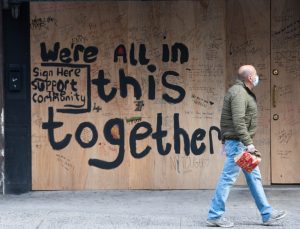Preface
By Danielle Hitch
I clearly remember entering the walk-in wardrobe that doubles as our home office and tapping my partner on the shoulder, “This pneumonia thing in China seems really awful!”. It was February 2020, and we were both becoming increasingly alarmed about a new virus called ‘COVID’. A week later, we pulled our kids out of school and started telling everyone we knew as much as we could about what was headed our way. Initially, no one really listened, or they thought we were overly dramatic, “We’ll be fine; they’ll stop it way before it gets to Australia”. Two weeks later, our entire community in Melbourne, Australia, entered the first of many lockdowns. And nothing would be the same again…
Communities all over the world experienced unprecedented disruption and dislocation. Video by ABC News Australia.
The world continues to grapple with the ongoing COVID-19 pandemic, and over time it has become clear that acute infection is just the beginning for some people. As the initial wave ebbed, patients began to raise the alarm about distressing symptoms that persisted for months after their initial infection. These symptoms sometimes mimicked the post-viral sequelae from other infections, causing fatigue, breathlessness and brain fog. However, many other problems were also reported by patients, who were often unable to receive care due to ongoing public health restrictions.
In October 2020, a partnership between Western Health and Deakin University called WHCOVRE was founded to investigate the mechanisms and experience of COVID-19 recovery to develop quality care that helped these patients achieve their best possible recovery. We soon discovered that COVID-19 rehabilitation was complicated, contentious and incredibly challenging. Little traditional evidence or expertise existed due to the novelty of COVID-19, and we were very aware of how little we knew. We turned to lived experience experts (i.e. our patients) to learn as much as possible about the syndrome and were grateful for their time, honesty and willingness to partner with us. This open education resource (OER) book results from this ongoing partnership and brings multiple ‘ways of knowing’ about Long COVID together.
The purpose of this book is to provide health professionals and other caregivers with quality learning resources to enable their practice with people recovering from COVID-19 infection. The learning promoted by this book is embedded within the lived experience of people with Long COVID, who have co-authored and/or peer-reviewed the content. The goal is for readers of this book to gain the knowledge and skills they need to support people with Long COVID in their recovery and management of an ongoing (and in many ways) uncertain illness.
Importantly, its publication as an OER means this book can be a living resource that can be updated regularly to reflect the rapid development of knowledge and practice in this area. New chapters will become available regularly, and existing chapters will be updated as new material comes to light. Anyone can contribute to this book, and I am looking forward to seeing it evolve over time to fit the needs of healthcare professionals, other caregivers and (most importantly) people with Long COVID. This book is freely available to anyone with an internet connection – Long COVID is a global problem, and this is not the time to hide new knowledge behind a paywall!
Since the start of the pandemic, I have seen the impact of the COVID-19 pandemic on my local community. It has taken a huge toll on everyone, whether they’ve experienced a COVID-19 infection or not. But that toll is compounded and amplified for people living with Long COVID. As said by one lived experience expert;
I hope this book will help professionals, caregivers and patients to feel less ‘lost’. Making quality information available to everyone as quickly as possible and explicitly focusing on its potential to improve daily life will give everyone firmer ground to stand on.
I freely admit I am no expert on Long COVID – I doubt any one person could be given its complexity and diversity. This isn’t an old-fashioned book – you won’t be able to read this once and walk away with everything you need. This is an ongoing conversation, and I encourage you to tell us what you want to read about. Please contact the editorial team at covidtextbook@deakin.edu.au anytime with comments, queries and recommendations.
We are all facing the same storm, even if we are not all in the same boat.

References
- Gahan, L. (2022). Breaking free from Long COVID: Reclaiming life and the things that matter. Jessica Kinglsey Publishers. ↵
Western Health COVID-19 Recovery Collaboration

